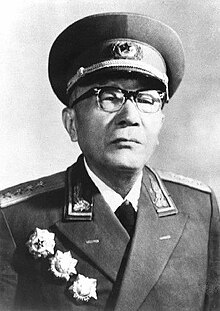Huang Kecheng
|
Senior General Huang Kecheng |
|
|---|---|
| 黄克诚 大将 |
|

General of the Army Huang Kecheng giving a speech
|
|
| Second Secretary of the Central Commission for Discipline Inspection | |
|
In office 11 September 1982 – September 1985 |
|
| Preceded by | Deng Yingchao |
| Succeeded by | Post abolished |
| Executive Secretary of the Central Commission for Discipline Inspection | |
|
In office 22 December 1978 – 11 September 1982 |
|
| Preceded by | Post established |
| Succeeded by | Wang Heshou |
| Personal details | |
| Born | 1 October 1902 Yongxing County, Hunan Province, Qing dynasty China |
| Died | 28 December 1986 (aged 84) Beijing |
| Awards |
|
| Military service | |
| Allegiance |
Communist Party of China |
| Service/branch |
|
| Years of service | 1926–1986 |
| Rank | General of People's Liberation Army |
| Battles/wars | Northern Expedition, Anti-Communist Encirclement Campaigns, Hundred Regiments Offensive, Campaign to Defend Siping, Siping Campaign, Liaoshen Campaign, Pingjin Campaign |
Huang Kecheng (simplified Chinese: 黄克诚; traditional Chinese: 黃克誠; pinyin: Huáng Kèchéng) (October 1, 1902 – December 28, 1986) was a senior general (大将) in the People's Liberation Army.
Huang Kecheng was born in Yongxing, Hunan Province, and he was the third of four children. His father was Huang Qingzhu (黄清主), and his mother was Deng Longtao (邓龙桃). His family owned six mu of land. Since he was not the eldest son, his parents did not consider it a great priority to provide a good education for him. He worked as a farm labourer on his family land, and completed high school when he turned 20, in 1920, from the Hunan 3rd Normal School. Huang eventually joined Chiang Kai-shek's National Revolutionary Army, and he joined the Communist Party of China in 1925.
In 1929, Huang was serving under Peng Dehuai in a Kuomintang regiment stationed in northern Hunan. When Peng rebelled in June 1928, Huang joined him. Huang led the Yongxing campaign during Xiangnan (South Hunan) campaign in 1928, and participated major battles encountered by the Red Army Third Division. Huang participated in the Long March, and, upon arrival on northern Shaanxi, he was promoted to be the director of the general political and organizational department. In the beginning of the Second Sino-Japan War, he was the political commissar of 344 brigade, affiliated with the 115 division of Eighth Route Army. His army accompanied Xu Haidong, fighting in regions across Shanxi, Hebei and Henan. After 1940, he became a political commissar in the Eighth Route Army and the New Fourth Army, and later the deputy and logistics commander of Northeastern Democratic Alliance Army.
...
Wikipedia
